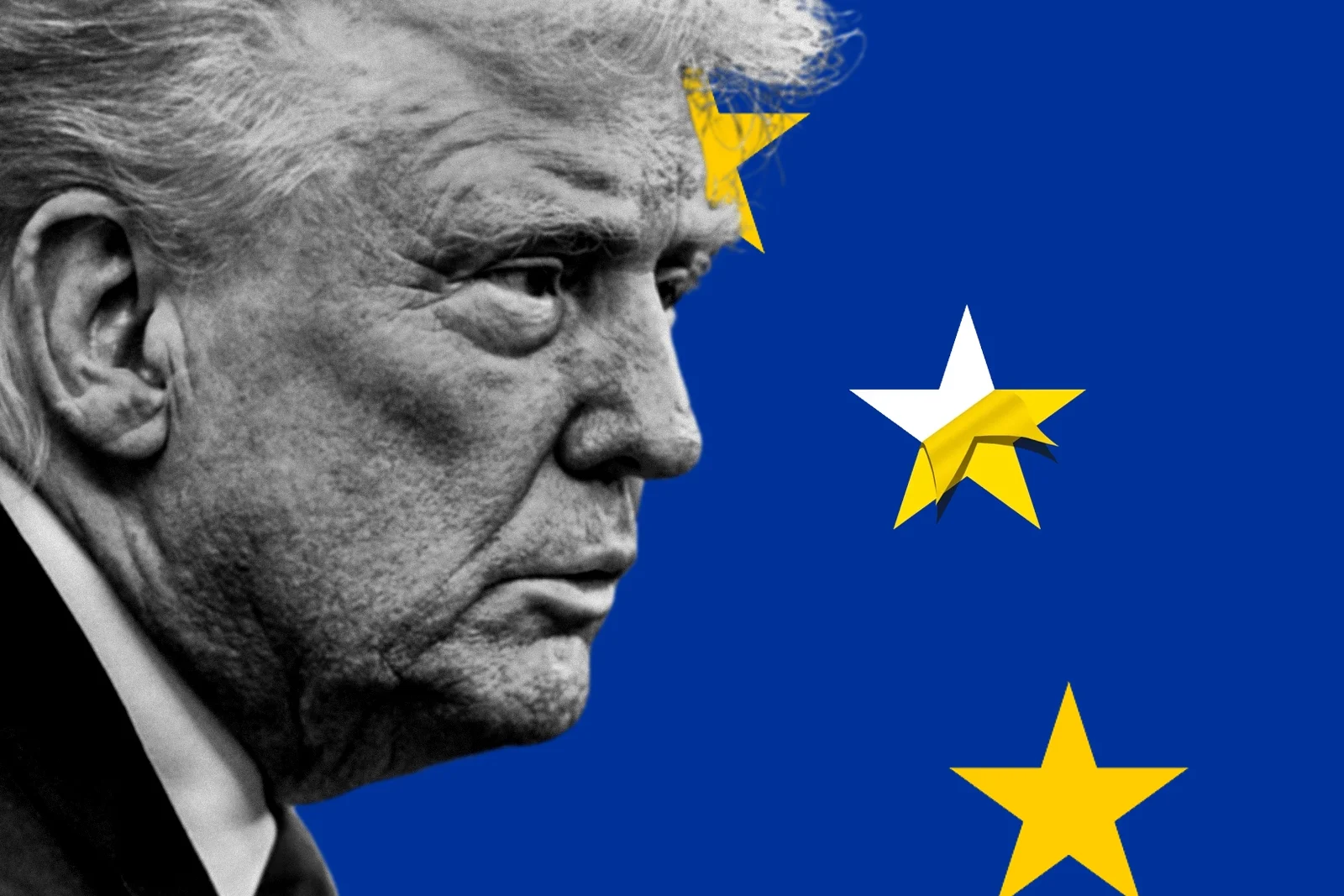
EU Tries to Steer Through Latest Trump Turbulence
Donald Trump has launched into his second term as president with characteristic turbulence, quickly thrusting global markets into a fresh storm.
This time, the disruption comes from Trump’s self-declared overhaul of global trading norms. The European Union, among the hardest hit, was left reeling after Trump imposed a sweeping 20 percent levy on all EU goods entering the United States—later trimmed to 10 percent after a market rout prompted what he called a “90-day pause.”
The tremors of Trump’s tariffs spread far beyond Europe. Asian economies were particularly jarred. A spokesman for the Taipei Representative Office to Belgium and the EU, speaking in an interview, underscored Taiwan’s concern: “The partnership between Taiwan and the U.S. is strong and ensuring. There are many developments that can reflect on this robust relationship. That said, the tariffs have indeed created a big challenge for Taiwan, and we believe the tariffs does not reflect the actual economic and trade situation between Taiwan and the U.S. Taiwan President Lai made the public announcement that we will not retaliate and are seeking to jump-start serious negotiations with the U.S. with the view of removing tariff and non-tariff barriers, facilitating measures to encourage US imports and mutual investments.”
In Brussels, pressure is mounting for the EU to leverage the World Trade Organization and collaborate with global partners to de-escalate the crisis through diplomatic means. In that spirit, a high-level European Parliament delegation has been dispatched to Washington for discussions with members of the U.S. Congress.
Meanwhile, European Commission President Ursula von der Leyen placed a call to Chinese Premier Li Qiang ahead of the 50th anniversary of EU-China diplomatic relations in 2025. The conversation quickly shifted to the immediate crisis. Von der Leyen emphasized Europe’s and China’s shared responsibility, as two of the world’s largest markets, to support a strong, reformed trading system—free, fair, and founded on a level playing field. She urged China to play a critical role in mitigating the risk of trade diversion, particularly in sectors already strained by global overcapacity.
Trump’s tariffs, which he has cast as a nationalist triumph, have sent shockwaves across the global economy, marking what could be a pivotal moment in economic history. The question confronting Europe is how to respond—an answer that may shape the continent’s trajectory for years to come.

The response in Brussels was swift and fierce. Bernd Lange, chair of the European Parliament’s International Trade Committee, pulled no punches. “While President Trump might have called it ‘Liberation Day,’ from an ordinary citizen’s point of view, this was ‘Inflation Day.’ These unjustified, illegal, and disproportionate measures can only lead to further tariff escalation and a downward economic spiral for the U.S. and the world as a whole. Because of this decision, U.S. consumers will be forced to carry the heaviest burden in a trade war.”
His outrage was echoed by Martin Schirdewan, co-leader of The Left in the EU Parliament, who warned, “The working class are always the first to suffer in war, and a trade war is no different. Trump’s tariffs will hurt European industry and the American working class first and foremost. While the EU must react with our own trade measures, we need targeted tariffs that hit Trump’s allies and the American oligarchs who are enriching themselves at the expense of workers.”
Terry Reintke, co-leader of the Greens/EFA Group in the European Parliament, added a note of caution, warning that tariffs “ultimately hurt everyone” and would drive up car prices in both Europe and the United States. She insisted the EU’s response must be “clear and decisive,” declaring, “We will not let Donald Trump divide us.”
Criticism has also poured in from the business sector. BusinessEurope Director General Markus J. Beyrer warned that additional duties on cars and car parts will raise costs and risk undermining investments across both continents. “Instead of increasing tariffs, the EU and the US should be committed to eliminating duties to generate more market opportunities and stimulate investments,” he argued.
The European Federation of Food, Agriculture and Tourism Trade Unions (EFFAT) expressed “deep concern” about the tariffs’ impact on an agricultural trade relationship worth more than €30 billion annually. European exports of wine, cheese, chocolate, olive oil, and spirits to the U.S. support hundreds of thousands of jobs—many of them in rural communities and small businesses. In turn, the EU imports vital commodities such as nuts, soy, beef, animal feed, and wheat from the U.S.
“These tariffs unfairly target European producers and workers, putting pressure on wages, job security, and market stability,” warned Enrico Somaglia, EFFAT’s General Secretary. Yet he cautioned against a tit-for-tat escalation, warning that retaliatory measures could further destabilize food markets, drive up prices, and endanger food security.
In assessing Trump’s initial 20 percent tariffs—now reduced to 10 percent—it is crucial to step back and consider the broader picture to inform the EU’s policy response.
Anna Kolesnichenko, a policy analyst at the Foundation for European Progressive Studies, acknowledged that Trump’s tariffs would undoubtedly disrupt European exporters and contract production. Yet she also identified a potential silver lining: the opportunity to correct systemic global imbalances.
Kolesnichenko argues, “It is well known that the trade regime that we had so far has produced many distortions in the global economy: some countries are running massive current account surpluses (China and Germany), others (notably US) are in current account deficit. Trump is correctly concerned about this. Trump’s method, however, is sub-optimal, to put it mildly. A much better solution would be capital controls on financial flows to the U.S., which would also cause rebalancing of trade.”
Christian Nasulea, a professor at the University of Bucharest and co-author of “Trade in a Time of Tariffs,” urged a cautious and strategic EU response. Tariffs should be imposed only on U.S. imports that can be easily replaced elsewhere, he said. Essential goods must be spared to avoid fueling inflation and harming vulnerable consumers. Simultaneously, barriers with other global partners should be dismantled without delay.
Adam Bartha, director of EPICENTER, echoed this caution, warning that retaliatory tariffs would inevitably be borne by EU citizens themselves.
Charles Grant, director of the Centre for European Reform, placed Trump’s second presidency among seismic historical events, comparing it to the fall of the Berlin Wall and the 9/11 attacks. He warned that tariffs increase inflation, restrict trade, hinder growth, and introduce significant uncertainty into the global economy. Yet he also identified unexpected benefits: Trump’s tariffs are inadvertently strengthening European unity, restoring Germany’s leadership role within the EU, and nudging post-Brexit Britain closer to the European continent.
“In every lifetime,” Grant observed, “there are a few events that mark turning points in history, such as the fall of the Berlin Wall in November 1989, al-Qaeda’s attack on the World Trade Centre in September 2001 – and now Donald Trump’s return to the US presidency in January 2025. Though he has been in office less than three months, Trump’s words and actions are already creating tectonic shifts in geopolitics.”
While outrage dominates the political and business response, a few voices have cautiously welcomed Trump’s disruptive impact. Frank Furedi of MCC Brussels argued that Trump’s tariffs are a much-needed wake-up call for Europe.
“From a U.S. domestic perspective, Trump is speaking to the forgotten workers, bringing jobs and defending those left behind,” he said. “But from a European standpoint, he’s delivering a much-needed—and costly—wake-up call: Europe must face its productivity issues, embrace efficiency, and stop kowtowing to misguided anti-business environmental and energy policies.”
Furedi concluded, “Trump may be the catalyst Europe needs to reclaim its competitive edge, yet it’s a shame it took him, not European elites, to force the continent into facing its economic realities.”
